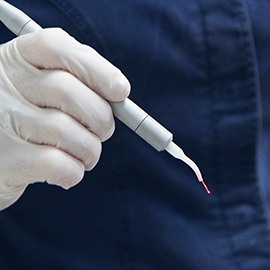Lip & Tongue Tie Treatment – Midland, TX
Pain-Less Treatment to Improve Oral Movement

Lip and tongue ties are most commonly diagnosed in infants, as parents typically notice the signs while they’re nursing or bottle-feeding, like poor weight gain, colic, and difficulty breastfeeding. As time goes on, when left untreated, severe lip and tongue ties in Midland can also lead to a host of developmental problems, like speech impairments and breathing disorders. Fortunately, our experienced team at Midland Kid’s Dentist offers pain-less, fast, and effective laser frenectomies to help your little one gain complete oral function.
Why Choose Midland Kid’s Dentist for Frenectomies?
- Kid’s Dentist Certified in Laser Dentistry
- Faster Recovery Times with Advanced Technology
- We Accept Virtually All PPO Insurance Plans
How Do Lip & Tongue Ties Develop?

Lip and tongue ties develop during gestation, as your baby is still growing. Pieces of tissue, called frenum, form that connect their lips to their gums and their tongue to the floor of their mouth, but when these are too long or thick, they can restrict oral movement, leading to a variety of issues. Some of the most common signs that parents notice that prompts them to have their infant examined for a lip and tongue tie include:
- Difficulty latching while nursing
- Sore nipples or clogged milk ducts.
- Poor weight gain.
- Excessive fussiness due to colic and digestion issues.
- Aversion to foods with certain textures.
Why is It Important to Treat Lip & Tongue Ties?

When not treated, lip and tongue ties can cause problems throughout your child’s life, including difficulty breastfeeding when they’re infants as well as speech development problems down the road. With a frenectomy, they’ll be able to move their lips and tongue more easily, allowing them to properly suck while nursing as well as making it easier for them to pronounce certain sounds. In cases where the lip and tongue ties are more severe, children without treatment can even develop breathing disorders. That’s why our team urges parents seek treatment for their child as soon as possible, when necessary.
What Happens During a Lip & Tongue Tie Treatment?

At Midland Kid’s Dentist, we use a soft tissue laser to complete our frenectomies. This high-tech device emits a thin beam of light that can precisely remove overgrown oral tissue, all while cauterizing the area on-contact to minimize bleeding and pain. The enhanced precision of this instrument ensures that we don’t remove too much of the frenum, while its ability to kill bacteria in the surgical area helps drastically reduce recovery times and post-operative risk of infection.
Lip and Tongue Tie FAQs

As a parent of a child who requires treatment for a lip or tongue tie in Midland, it’s natural to have many questions. This is why Dr. Vupalla has made it easy to get the answers you need. By reviewing the list below, you can better understand the process and also get an idea of any remaining questions you might have that you would like to discuss with our team.
Does a frenectomy hurt?
No, you will be pleased to learn that laser frenectomies cause only minor discomfort. In most cases, it is not necessary for our team to apply any local anesthetic. The reason is that these lasers contain a precise laser that targets only the restricted band of tissue. It also cauterizes the tissue so that it minimizes the amount of bleeding your little one will experience. However, should we see that the banded tissue is rather thick, we will administer local anesthesia beforehand to ensure optimal comfort.
Is my child older enough to get lip or tongue tie treatment?
It might seem difficult to imagine your baby undergoing any kind of procedure, but a frenectomy is completely safe. The truth is there is no age minimum for this particular procedure. Because it can be performed within a few days of a baby’s birth, it is virtually available to everyone. And although you might hope that your child’s lip or tongue tie will simply go away on its own, this is impossible, which is why you should not postpone treatment. The quicker a frenectomy is performed, the faster your baby will enjoy greater oral function.
Can I be in the room during my child’s frenectomy?
It is unlikely that you will be allowed in the room during your child’s frenectomy. It can often be difficult for parents to watch, so if you exhibit any signs of distress, your child will also likely adopt the same mindset and reaction. Not to mention, our staff will be required to tend to your needs, which takes the focus off of your child. Our team must be focused solely on the patient, but once treatment is complete, you can expect that we will call you back into the room so that you can see and comfort your child.
How will you keep my baby still for a frenectomy?
Naturally, it is our goal to keep every patient comfortable during their visit. When it comes to babies and frenectomies, we must ensure that they do not wiggle during the procedure. This is curbed by swaddling the infant snugly so that they will remain still and comfortable. This also helps them to feel more secure, which can lead to a less stressful experience.
How Should I Prepare My Baby for a Frenectomy?
Very little preparation is necessary prior to a frenectomy. Your baby will not remember the procedure or understand what is happening. However, it is still good to take measures to keep both your child and yourself calm before and during the procedure. Try to feed your baby about 60 – 90 minutes prior to their frenectomy so they are a bit hungry afterward and will be ready to nurse.
In the last few days before the frenectomy, we might recommend that you do some exercises with your baby to help them practice suction with their tongue. For example, you might allow them to suck on your clean finger. Gently pull it away so they have to work harder to keep it in place. Rubbing a finger along their lower gums can also be a good thing to do; their tongue should follow your movements.
What Could Happen If My Child Doesn’t Get Treatment for a Lip or Tongue Tie?
Some cases of lip and tongue tie do not require treatment. However, that is not a determination that you should make on your own. Bring your child to visit us so we can evaluate the situation and recommend your next steps.
If your child needs treatment but does not receive it, they may fail to thrive. They might not be able to feed properly, which can lead to slow weight gain. As they grow, they may experience speech delays and eating problems. Poor oral health, poor sleep, neck and shoulder pain, and other issues may also occur.
What Are the Dangers of Doing a Frenectomy Yourself?
In an effort to save money, some parents have mistakenly given in to the temptation to perform a frenectomy at home. Keep in mind, though, that this procedure can be very dangerous if it is not properly carried out. You might accidentally cause significant bleeding and pain. Infections are also a very real possibility. DIY frenectomies are never a good idea!
Will My Baby Cry During the Frenectomy?
Many babies cry a little before, during, or after their frenectomy. This is usually not due to pain; rather, it may be because they dislike someone holding their tongue or lip or because they are in an unfamiliar situation.
If you hear your baby crying, do not assume that something is wrong or that they are in a lot of pain. Our team is very careful to make the procedure as easy as possible for patients! Also, any discomfort they experience will be minimal compared to the future benefits they are likely to enjoy as a result of their frenectomy.
What Should I Do After My Child’s Lip or Tongue Tie Has Been Treated?
After a frenectomy, there is a slight risk that the modified tissue will reconnect. Some mild stretches can prevent this from happening. Our team will show you what you need to do. Using clean hands, you should gently raise the tongue or lip upward for a few seconds. You can also gently swipe a finger under the lip or tongue a few times a day for 2 – 3 days.
If necessary, you can give your child appropriate doses of pain medication while they are healing.
